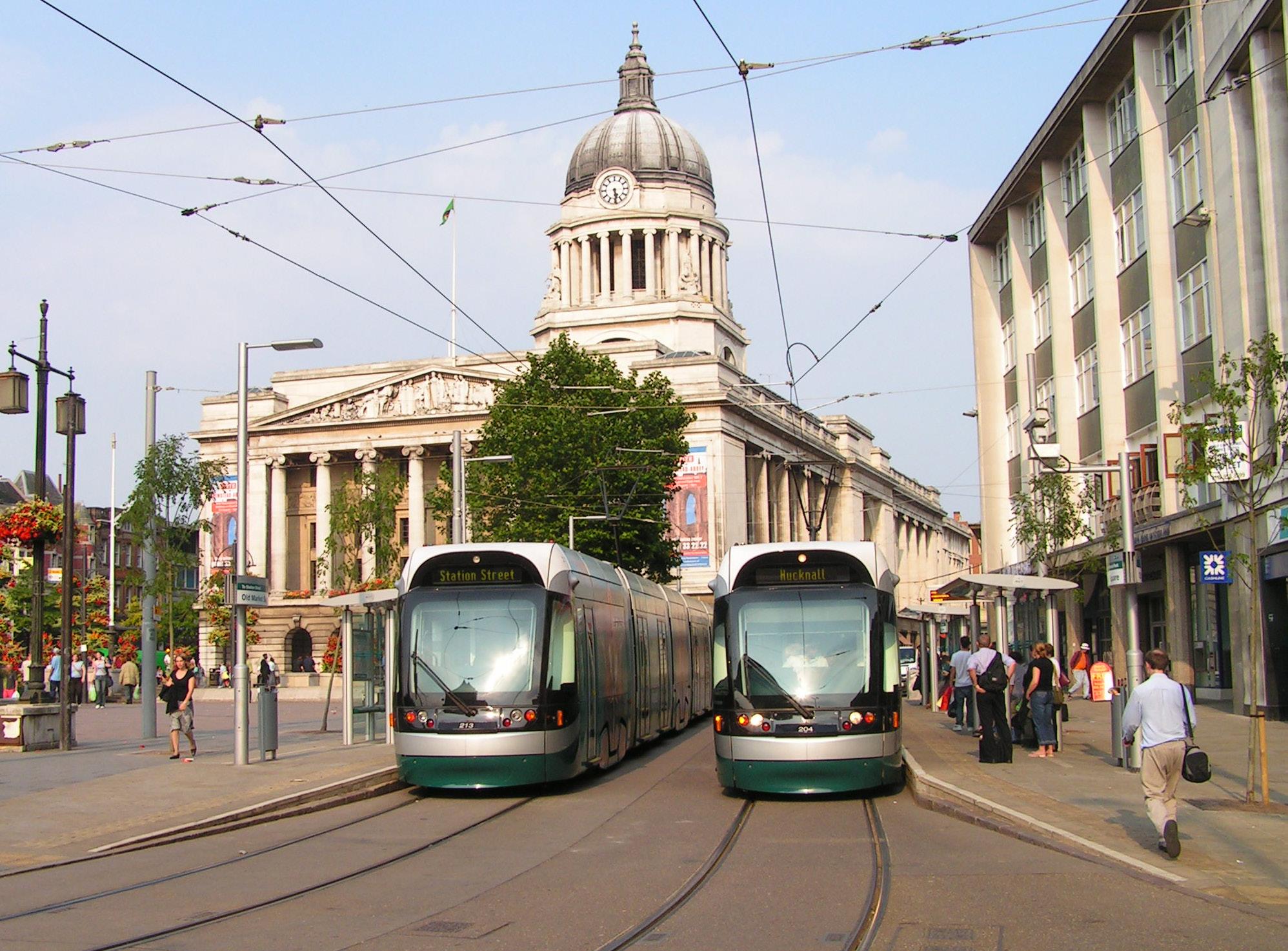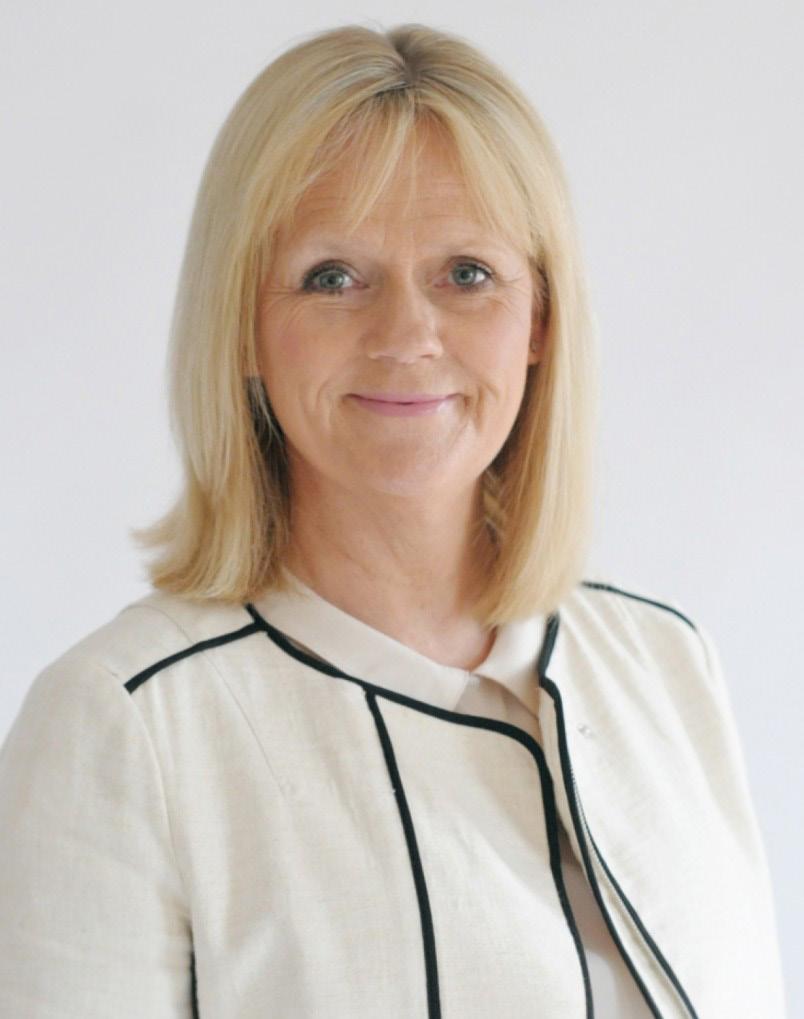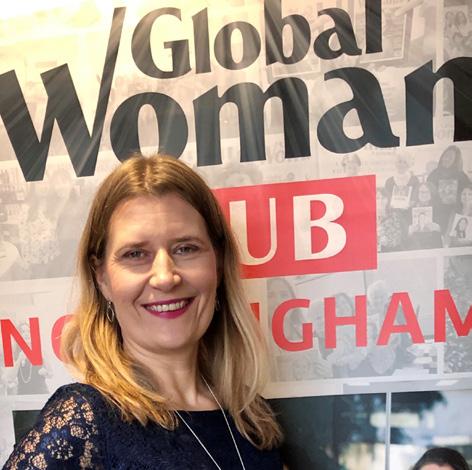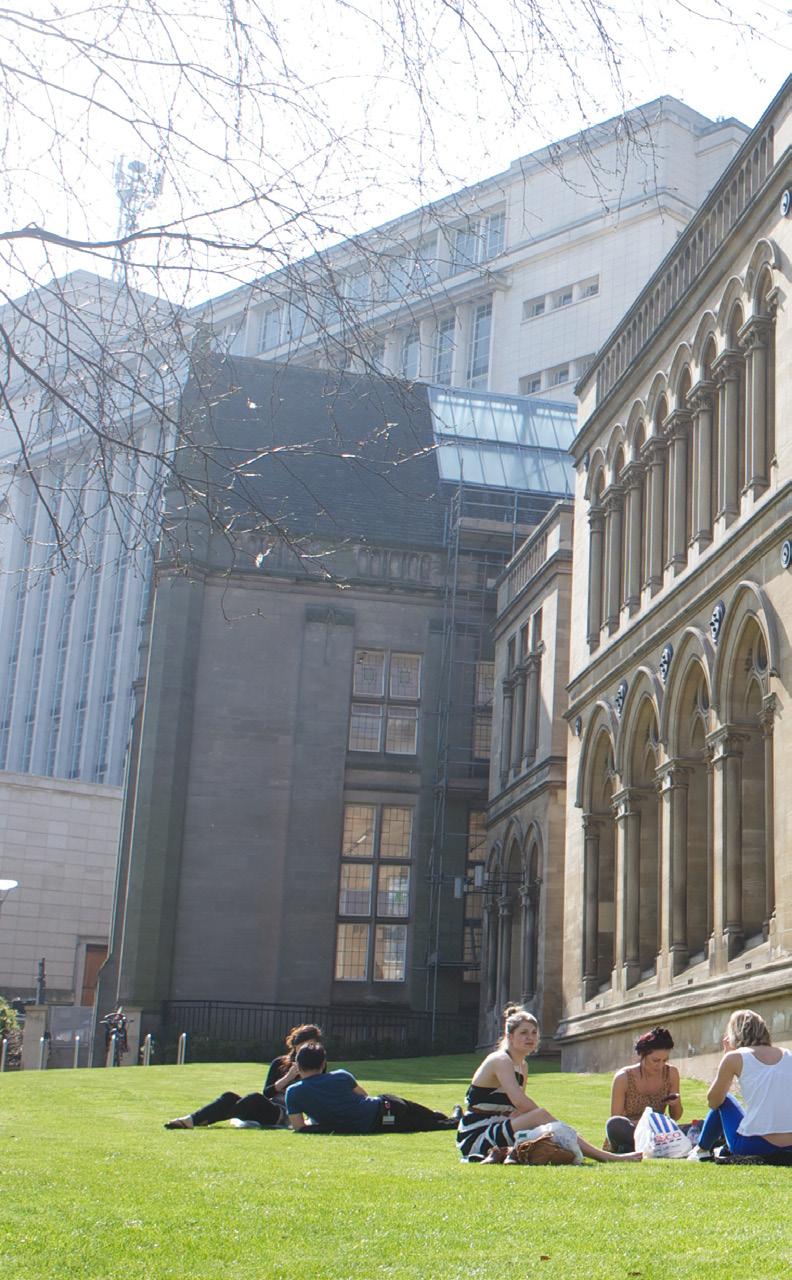
24 minute read
Feature: Nottingham
Acity whose industrial foundations were built on coal and lace, but which is now excelling in creative, tech, knowledge and life sciences, Nottingham is currently undergoing a £2bn facelift to boost its longterm prosperity. In the latest in our series of city spotlight features, Business Leader asks: what is driving the Nottingham rebirth?
What’s unique about Nottingham as a place to do business? Robert Dixon, Interim Chief Executive at Marketing Nottingham, said: “Nottingham is the largest economic area in the East Midlands. It is the home of amazing business such as Boots, Experian, Paul Smith and Games Workshop. It has two great universities, some of the best public transport in the UK and a positive, businessfriendly environment – with support for start-ups, scale-ups and businesses that are growing.”
60 Stuart Marriot, Associate Director, Careers and Employability Service at The University of Nottingham, said: “Nottingham has a strong business ecosystem with two fantastic universities, a great public transport system and a £2bn investment programme underway. “Home to major brands like Experian, Boots, Speedo and Capital One, there is a new generation of creative and entrepreneurial businesses creating a thriving city for business growth, particularly in the fintech and life science sectors.” Irina Richardson, Regional Director of Global Woman Club Nottingham and owner of Balanced Academy, said: “Nottingham is very diverse and vibrant city. There are many reasons why major brands have chosen Nottingham as their base. The varied nature of industries and businesses mark Nottingham as a major centre for business growth. “What I love about Nottingham is its great surrounding area with easily accessible villages. It allows families to have countrystyle living while still working and commuting
Robert Dixon Stuart Marriot Irina Richardson



to Nottingham. It’s great for mums, like me, to have a peace of mind that kids will have great education, thanks to many ‘outstanding’ schools in the area, as well as plenty of open spaces and fresh air to benefit from.” Lorraine Baggs, Head of Inward Investment at Invest in Nottingham, said: “Nottingham is the biggest business centre in the East Midlands and is currently undergoing one of the largest transformation programmes of any UK city in this decade. The Southside regeneration (worth well over £2bn) will bring new leisure and retail, a college and central library, improved public transport, grade A office space, homes and redesigned public spaces. “Nottingham is famed for its connectivity, frequently winning awards in this area. Its compact and walkable city centre, pioneering approach to city centre parking and award-winning, clean and green public transport system enables rapid access and congestion-free movement, making it an ideal business hub.
“Nottingham has a highly collaborative culture where big businesses nurture startups and support their growth. “The city also has two world-class, awardwinning universities, which have a high level of collaboration and engagement with local businesses, including collaborative research, sponsored research, student placements, graduate recruitment and executive education. The city offers competitively low operational costs for businesses and affordable house prices and higher disposable income for employees, meaning people can afford to experience more of the wonderful leisure, culture, retail and nightlife the city has to offer. What are the city’s strengths? Marriot: “Business can access two huge pools (65,000+) of talent from the University of Nottingham and Nottingham Trent University. 60% of the jobs in Nottingham are in knowledge-intensive industries, well above the UK average. “The universities also engage with businesses to deliver training and executive education, to provide access to worldleading research and expertise and access to facilities and equipment, including the University of Nottingham Innovation Park, which is home to more than 80 businesses employing more than 900 people.” Dixon: “Our central location means 80% of the UK population is within two hours of the city. Our two universities (both gold-starrated for teaching excellence – the only city with that accolade), have about 70,000 students who are a key part of the economy and a talent pool for businesses. “Public transport in Nottingham is second to none. The best bus network in the UK (officially) and a modern efficient and popular tram system that larger cities look at enviously. As a compact city, it is easy to get in and out, and then walk around.
“It’s also a friendly and welcoming city in which to do business. It was recently named the UK’s friendliest city and was recognised for business friendliness in the FDI European Cities and Regions of the Future 2018/19 and 2020/21 reports.” Cont.
“We have strong business networks that support start-ups, entrepreneurs, scale-up and larger businesses. There are over 30 flexible and incubator workspaces across the city, and support programmes and funding projects to help businesses grow. Some of our ‘smaller businesses’ such as Retail Assist, Unidays, TDX, Sygnature Discovery, 200 Degrees, Little Fish now employ hundreds of employees each, and only started in businesses in the last 10 years or so.” Richardson: “Nottingham has a mixture of great entrepreneurial spirit and large corporate businesses. Thanks to growing number of business networks, offering local support, it’s becoming easier to start and run your own business in the area. We at Global Woman Club in Nottingham, for example, are focusing on empowering women locally and connecting them globally. “Businesses in Nottingham benefit from direct access to a high-quality workforce thanks to two internationally-renowned universities, as well as the city having one of the youngest populations of any UK city. 29.7% of the population are aged 18 to 29 – full-time university students comprise about one in eight of the population. “Thanks to a great transport network, it is one of the cleanest, greenest and least cardependent cities in the UK.”

62 Baggs: “Nottingham is a connected city in the heart of the UK, and just 14 miles from East Midlands Airport, helping businesses to capitalise on the opportunities in both UK and global markets. “It has a high-quality workforce, with two universities providing the talent, skills and innovation needed to grow a business, and over 1.1 million people within its recruitment catchment. Nottingham has award-winning, clean and green public transport, with the world’s biggest fleet of biogas buses and the UK’s most-used-per-head tram network. “Significant investment into transport infrastructure over the past few years means staff can access their place of work with ease. Nottingham is a city that lends itself to growth – as the biggest business centre in the East Midlands offering competitively low operational costs, it’s no surprise that it was recently named top city for small business growth.”


Lorraine Baggs
Stuart Marriot
And what are Nottingham’s weaknesses? Baggs: “Nottingham has traditionally suffered from a lack of grade A office space, and in recent years, as the city has become an increasingly attractive destination for businesses to set up and expand, it has struggled to keep pace with demand. Thankfully, many of the developments either in progress or in planning are set to provide a wealth of new office space to address this issue.
“The city has also struggled with graduate retention, likely attributable to the high number of students originating from London who return there after graduating.
There are a number of campaigns and projects in place to rectify this, such as the Graduate Retention Partnership established between Nottingham Trent University, the University of Nottingham, Nottinghamshire County Council and Nottingham City Council which aims to ‘secure commitment’ from Nottinghamshire employers to ‘create additional graduate level employment opportunities’ going forward.”
Boots Island - Linear Park

Dixon: “We could do with faster trains to London (electrified line and HS2 – not just faster to London but to Birmingham in 30 minutes and Leeds in 30 minutes). We could do with more investment from government – we are often overlooked as London/Westminster looks to Andy Street in Birmingham or Andy Burnham in Manchester.”
Richardson: “One of the weaknesses is the almost-two-hour journey from Nottingham to London. We are awaiting HS2 construction to speed up the time it takes to get to London and Europe.
On the plus side we already have East Midlands Airport on the doorstep, which has also got Cargo Airport acting as a UK hub for DHL and UPS, and supporting operations for TNT and Royal Mail. “Unfortunately, despite many affluent areas in and around Nottingham, there are still 34.2% of children and 25.8% of people aged 60 and over affected by income deprivation.” Which sectors are traditionally strong in Nottingham – and how has that changed in more recent years? Baggs: “Nottingham has a rich history when it comes to industry and invention. Much of the area’s early wealth was based on coal, and it was also the UK’s centre for the production of lace, evidence of which can be seen today in the redbrick Victorian warehouses in its Lace Market area. Nottingham was also known for its Raleigh bicycles and John Players cigarettes.” Dixon: “Nottingham used to be coal, lace, bicycles and cigarettes. That’s now pretty much all gone and over 95% of Nottingham is now service-based.
Robert Dixon
“More people now work at the old Raleigh Factory which is now the Jubilee Campus of the University of Nottingham – high value, knowledge-intensive jobs.” Baggs: “Today Nottingham is experiencing rapid growth in its knowledge-intensive industries. It has a great reputation for innovation-led high-growth sectors such as fintech and bioscience, and is home to the UK’s largest bioscience incubator, Biocity.
“It has a reputation as a great destination for tech businesses, with Capital One, Experian and Ikano based in the region. Nottingham was also recognised as one of the top 10 Tech Cities outside of London in the CBRE’s Tech Cities report in 2019. It’s also a creative city, and businesses and students have access to specialist world class hubs at Confetti dedicated to digital media, film, TV, music and events.” Marriot: “Nottingham is traditionally strong in sectors including financial and business services, life sciences, creative and digital and advanced manufacturing. There is an increasing number of organisations with digital expertise – from marketing and social media enterprises through to global businesses that deal with huge volumes of data. “Nottingham City Council, University of Nottingham and Nottingham Trent University have joined together to launch Nottingham Tech 1000 to enhance digital skills across the region. The programme aims to ensure attractive opportunities are available to school leavers, graduates, those already in the region and those looking to locate here.” Dixon: “Growth sectors are education, creative, digital, life sciences, cleantech, professional services and visitor economy. Retail remains a large part of the economy, but it relies on a strong business base to thrive. On education, the two universities alone are about 15% of the economy. “In life sciences, we have a strong primary health and beauty sector but also a strong medical technologies and medical devices sector. Bio City is the most successful life science incubator in Europe and the city is home to several clinical trials management companies in medtech. In the future, it is expected that cleantech and fintech in particular will grow; clean tech as the city has some innovative projects in low carbon sector (housing, energy and transport), and fintech, based on some of the recent spinout companies that are growing fast.” Richardson: “Nottingham leads the way in a number of industries, including financial and business services, creative and digital, life sciences and advanced manufacturing, low carbon, and construction. “Personally, I see future growth in independent healthy life choices areas, like coaching, mentoring, health, exercise, women and children empowerment. “The significance of climate change and the low carbon economy is likely to present future growth, either through the development and provision of low carbon goods and services, including low carbon housing and retrofit, or through savings in areas such as energy or waste reduction, providing a market for local low carbon economy businesses.” What are the main challenges and opportunities of evolving Nottingham from an economic perspective? Marriot: “Relatively high incidences of skills shortages and gaps affecting many industries but particularly manufacturing, engineering and other technical disciplines. Graduate retention is a challenge that contributes to this broad issue. Higher education institutions, business and local authorities can do more to support this.” Richardson: “Almost nine out of 10 jobs in Nottingham are in the service sector. Perhaps a more diverse economy would give more beneficial opportunities for varied interests of a younger generation to stay in the area.” Dixon: “Our educational attainment is still behind the national average for five to 18-year-olds (despite having two great universities). And, as with many other large cities, there is visible homelessness/rough sleeping/antisocial behaviour.

Irine Richardson

“Opportunities? Southern Gateway which includes Broadmarsh shopping centre, new library, renovated Castle, new Nottingham College, 4,000 jobs at the HMRC new site at Unity Square – a major opportunity to get more people into the city centre.” Baggs: “It is imperative the city keeps pace with the ever-increasing demand for grade A office space as this high demand is predicted to drive up rents by £5 per sq ft over the coming years. A wealth of new developments across the city will help the city to welcome start-ups and enable businesses to expand here. The city’s flexible workspace occupation is also estimated to be around 90% according to the GKRE Flexible Workspace Market report, and this sector will also play an important role here as more and more businesses turn to this as a viable solution. “Nottingham is also focusing heavily on the quality of life it offers. Investment in public transport, green spaces, culture and leisure – and ensuring it promotes these at a national level via campaigns such as Invest in Nottingham’s Quality of Life campaign, which is building momentum – will all help to attract businesses and talent to the area and contribute to the long-term prosperity of Nottingham.”
Lorraine Baggs


What does the future hold for Nottingham? Marriot: “Nottingham is undergoing significant economic regeneration. A redevelopment of part of the city, worth £2bn, will change the southern gateway to the city and provide new commercial, retail and tourism facilities. “There has also been investment into infrastructure. Nottingham has one of the UK’s best public transport networks with a commitment to green travel and sustainability. Nottingham also stands to benefit from HS2, with plans for an East Midlands Hub in Toton on the outskirts of the city.” Richardson: “There are projects on the way to dramatically transform and regenerate the Broadmarsh shopping area of the city centre to boost the local economy, create jobs and attract more visitors. Works are underway to transform the area with improved shopping, leisure and restaurant facilities in a vibrant new environment.
“A lot of new housing developments are on the way within a half an hour commute to city centre, which makes Nottingham even more attractive for work placement relocations.” Baggs: “The ambitious £2bn Southside programme will dramatically transform the southern face of Nottingham. The regeneration of this unique 0.5-square-mile area is set to boost the city into the top six UK retail centres, strengthen the local economy, create thousands of jobs and attract more visitors. Plots of previously underused, derelict and brownfield land are set to be filled with a variety of ambitious, impressive and inspiring developments. “These developments, which are either under construction or in the pipeline – including the 40-acre Island Quarter – will comprise well over two million square feet of office space, accommodation units, creative trade floorspace, hotel and retail space, while entire new neighbourhoods (such as the sustainable 27-hectare Waterside development) are also in planning. “Nottingham’s Southside is rapidly gathering pace and taking shape, with an unprecedented number of cranes in the sky and fresh announcements from investors and developers now almost a daily occurrence. This regeneration is stimulating investor interest and confidence in the city like never before. “All of the developments are set to transform not just the physical landscape of the city and create construction jobs in the shortterm, but will also boost Nottingham’s prosperity in years to come. The development of the Broadmarsh area alone is expected to boost the local economy by more than £1bn over a decade, elevate the city into the top six UK retail centres, create nearly 3,000 jobs and attract an extra three million visitors a year The shiny new retail scheme will act as a physical and a metaphorical shop window: showcasing parts of Nottingham’s high quality of life to potential residents and investors.” Dixon: “Apart from Southern Gateway, which is live now, other major developments in the city centre, such as round Sneinton Market, and then down towards Island Site, have the potential to impact the city significantly.
“Also, on the edges of the city or just outside, HS2 at Toton, The Ratcliffe on Soar redevelopment site, the expansion at East Midlands Airport, the distribution centre at Roxhill near the airport, the developments round the Gedling Access Road and the extension of Clifton at Fairham pastures are all major developments showing the strength of the economy and the aspirations for growth.”
Terra Motion: A star in the UK space sector
Terra Motion is a leading provider of ground motion products – and its pioneering work is being used to help tackle some of the world’s major challenges, including combating climate change and human slavery, and supporting renewable energy deployment. Based in Nottingham, Terra Motion has a global customer base with clients in North America, Asia and Europe. After winning the prestigious Copernicus Masters prize, also known as the ‘Space Oscars’ in 2014, the business was last year chosen as one of the 15 star companies in the UK space sector by Business Leader Magazine. At the forefront of technology and innovation, Terra Motion uses data gathered by Earth observation satellites to map the motion of the Earth’s surface to millimetric accuracy. Uniquely, the technology the firm has developed can map this movement over a complete set of natural and vegetated surfaces, as well as urban areas. This has opened completely new markets for the business, addressing key challenges such as monitoring and combating the effects of climate change, supporting renewable energy deployment and improving carbon accounting, as well as providing a more comprehensive service for clients in established sectors such as planning, insurance and infrastructure risk monitoring. This novel solution to the problem of monitoring ground motion in rural areas was developed by Dr Andy Sowter when at the University of Nottingham. Dr Sowter retains strong links with
66 academic colleagues, who are continuing to develop, test and publish new research findings based on this revolutionary approach. As an example, collaborations with a number of universities across the UK are showing that the technology can be used to quantify the success of peatland restoration, an important way to fight climate change and address the nation’s carbon balance. Terra Motion is also currently involved in demonstrating the use of its unique approach to find evidence of modern slavery and in the monitoring of renewable energy sites. The basic products offered by Terra Motion are maps of the rise and fall of the land surface over time. These maps can cover anything from an area the size of a private allotment to an entire country. The company recently completed a number of surveys of the entire Netherlands for the Dutch Ministry of Water Management

and Infrastructure to help model climate change resilience and has provided detailed baseline profiles of land motion over a number of brownfield sites across the UK to support commercial planning applications. As these new applications emerge, the company is finding a niche in the support of sustainable markets, far away from the more traditional engineering geology applications addressed by their competitors. Terra Motion has a mission to further consolidate its role in climate change, renewable energy and carbon capture and storage and to establish the company as a key provider at local, regional, national and global scales to help restore and preserve major ecosystem services.

Why Terra Motion is ‘breaking the mould’

Business Leader caught up with Terra Motion Chief Technical Officer Dr Andrew Sowter to learn more…
Can you talk us through the origins of Terra Motion? The key technology that underpins our novel solution to measure earth surface movement was invented in 2012 while I was a Lecturer at the University of Nottingham. Although we recognised the very real research potential this could enable, we could see the huge commercial possibilities and user benefits the technology offered, too. We entered a major European commercial innovation competition in 2014, won it, and shortly after, received grant funding from the UK government. We began trading in 2015 as Geomatic Ventures Limited and only recently re-branded as Terra Motion Limited to raise investment and also to focus on the green agenda. It’s a major venture to get off the ground – where did you get the support and financial backing to make this vision a reality? Winning the Copernicus Masters in 2014 was a major boost and gave us huge confidence when we applied for financial support. We were almost immediately successful in gaining Launchpad funding from Innovate UK, with the support of the university, and were part of the ESA Business Incubation Centre in Harwell for a year. This was a brilliant start that allowed us to employ staff to turn a research capability into a commercially viable production line. How has TerraMotion grown since its inception? The most dramatic change in the company has been the operating capability. Back in 2015, it would take as much as three weeks to survey the area of a single satellite image frame, some 250km square. Now we can complete a survey of the entire UK, comprising around 28 image frames, in about six weeks. This would not be possible without the two Senior Technical Officers that we employ, David and Ahmed, who really should take some credit. We’ve also built up a considerable, and growing, portfolio of commercial clients across sectors such as consulting engineering, mining, property planning and conveyancing and transport network management.
TerraMotion is today supporting efforts to combat a number of major global issues, such as climate change and modern slavery. How important is this to you? It is fantastic, I have to say, and was not foreseen when we started the company. Traditionally, the satellite technology we use has been the preserve of engineering surveyors and geologists so to now be around the table with ecologists, environmentalists and human geographers is quite extraordinary. To be able to contribute, and to contribute significantly, by providing new types of data that could impact on people’s quality of life and on the future of the planet is something we all aspire to, isn’t it?
SATELLITE BASED GROUND MOTION SURVEYS FOR:
Your work has been celebrated through a number of prestigious awards – how much does that recognition mean to you? Starting a company can be very daunting and it can be very hard to establish yourselves as an innovative company in a highly competitive field. But we have weathered the storm, proven our worth, and are now really breaking the mould with what we have done. Awards are a massive indication that, somewhere out there, someone recognises you are doing a good job and it’s an encouragement to keep going.
How much further can your tech evolve? What are your ambitions for the future? Oh, there are always improvements to our processing capability that need to be done. Mapping is great but we are seeing a growing demand for regular monitoring services, which has big implications for processing, storage and organisation. It is also changing our perspective on how to deliver such high-volume and specialised products in a way that a client will find easy to use. However, this is only the start. If we are to get a grip on climate change then we will need to do this sort of monitoring everywhere from the tundras of the high Arctic to the peat swamp forests on the equator. A challenging prospect in many ways but oh so very thrilling, too!
Canadian billionaire leads group buying stake in Aston Martin

Canadian billionaire, and owner of F1 racing team Racing Point, Lawrence Stroll has acquired 20% of Aston Martin Lagonda for £182m. A major decline in sales led to the iconic British luxury carmaker suffering a difficult year, putting pressure on the company to seek alternative funding to secure the future of Aston Martin Lagonda. Stroll and his consortium will initially acquire a 16.7% stake, which could rise to 20% upon completion of the company’s plan to raise a total of £500m. He said: “Aston Martin Lagonda makes some of the world’s most iconic luxury cars, designed and built by very talented people. Our investment announced today underpins the company’s financial security and ensures it will be operating from a position of financial strength. I, and my partners, firmly believe that Aston Martin is one of the great global luxury car brands. I believe that this combination of capital and my experience of both the motor industry and building highly successful global brands will mean that, over time, we fulfil Aston Martin Lagonda’s potential.”
Shawbrook Bank provides UK’s largest tomato supplier with £25m funding package

Specialist SME lender Shawbrook Bank has successfully completed its largest-ever working capital transaction in the North West, providing APS Group with a £25m bespoke funding package. First founded in 1949 on one site in Cheshire, APS Group is a family-owned business which specialises in the production and supply of top quality tomatoes. Growing at six sites and producing over 500 million tomatoes a year, APS Group was looking to further improve its cultivation and harvesting facilities to maintain its service levels whilst delivering higher yields in the coming season.
From 2.75 million plants, APS Group produces 65 varieties under 70 hectares of glass and harvests 25,000 tonnes of tomatoes every year.
John Phibbs, CFO at APS Group said: “APS Group has experienced rapid growth over the last 12 years and our aim over the coming seasons is to increase productivity levels but continue to grow in a sustainable and environmentally friendly way. We therefore needed to streamline costs and further improve our horticultural facilities.”
Willmott Dixon Interiors wins £3.8m Warwickshire County Council contract

68 Warwickshire County Council has appointed Willmott Dixon Interiors to deliver the £3.8m refurbishment of its storage facilities in Warwick.
The office fit-out and refurbishment specialist contractor has started work on the 50,000 sq ft warehouse facility at Hawkes Point, on the Heathcote Industrial Estate.
The warehouse, which has been used as a storage facility by Warwickshire County Council, will be divided into individual storage space to enable occupation by several council departments, including fleet maintenance, library services, archaeology, music, facilities services, rights of way, transport operations and catering services.
Phil Crowther, operations director at Willmott Dixon Interiors, said: “The appointment further demonstrates the strength of our reputation in creating fantastic spaces able to meet the aspirations of both public and private sector organisations seeking high quality accommodation within the region. Through our close connection to Willmott Dixon’s construction arm, we are in a unique position to provide a fully one-stop service for our customers.”
Business Leader launches
Connecting and inspiring

entrepreneurs
The new scale-up conference announced for entrepreneurs

JUNE 25 TH 2020 HILTON HOTEL WEMBLEY
LEADING TRENDS TO BE DISCUSSED
MARKET TRENDS FINANCE & FUNDING WORKFORCE & HR PROPERTY & OPERATIONS EXPORT & TRADE










